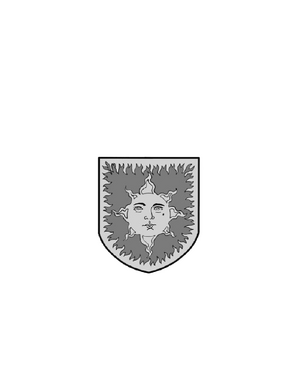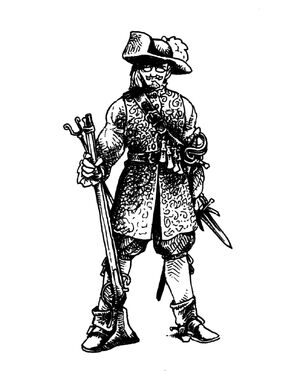
The arms of Montaigne are, azure (blue), a sun bearing a face or (gold), within a rayonny (flammulated) bordure or. The arms are sometimes abbreviated without the sun´s face or without the bordure, or the bordure may be displayed dancetty (zig-zagged) or engrailed. The sun is also used as a badge on clothing or ornamentation on chalices, swords´ hilts or pieces of jewelry, but may only be worn or carried by those in the direct service of the Empereur.
Montaigne is located to the northwest of the main continent Theah (south of Avalon).
History[]
Montaigne is the center of fashion, culture, art, and science. It is also an expansionist empire, ruled by a mad man who has declared the churche of the prophets (Vaticine, Objectionist, Ussura Orthodox, and Church of the Second-Prophet) illegal and the worship of Theus punishable by execution. The nobles are the very definition of "decadent" and the people of Montaigne suffer for it. To understand why this has happened, we must return to the Third Prophet. When Montaigne surrendered its magic for the right to maintain rule, it broke its vow and merely moved its study of magic to the shadows. It stayed there for centuries, until l'empereur Leon Alexandre announced to the world the secret - that he was a sorcerer, and one of great power. In response, Castille declared war on the nation of Montaigne. They pushed their way into the newly Pagan nation with a speed thought impossible, reaching the capital of Charouse in days, and pushing the Montaigne forces to the breaking point. L'empereur would have been killed as a heretic then and there were it not for a young corporal named Montague, who, in the heat of battle, reshaped the tactics of war forever. Cycling his troops (each line firing while the others reloaded) and using sharpshooters to take out enemy officers, Montague repelled the overwhelming force and put them into retreat. After being promoted to General of the Montaigne army, he gathered his forces and pursued the enemy army back to Castille and began the systematic conquest of their southern neighbor. Were it not for the mad command of l'empereur Leon, pulling him into an unprovoked, winter attack on Ussura, Castille would not have lasted the year. As it stands, Montaigne is in a stalemate with the Castille forces and in a very wise, full retreat from Ussura.
After the Castille defeat at Charouse, the Hierophant (leader of the Vaticine church) went to Montaigne to discuss the problem and seek a solution - having seen the suffering the War of the Cross caused. Several days later, Montaigne announced that the Hierophant had died of the plague and his body had been burned to prevent its spread. This threw the church into disarray, allowing Montaigne to maintain their power long after their break away from the church.
Politics/Relations[]
Montaigne is ruled by a large number of noble families, though the real power rests with l'emperour Leon. He directs all actions as he see's fit - for good or for bad. Montaigne has few relationships with any of the rest of Theah. Castille is in open warfare, the Crescents view them as the worst of the infidels, Avalon has never forgotten the Montaigne conquest of their home, Eisen will never forgive them for their attempt to conquer their land, and Ussura hates the Montaigne so much, the land itself seems to strike back against them. Only the Vendel and Vodacce have any contact with them, and only because it is so profitable for them. were this to change, Montaigne would be cut off from the rest of the world; perhaps permanently. The Vendel/Vestenmannavnjar|Vestenmannavnjar and the Cathay have no real contact with Montaigne and there is little chance of this changing in the near future.
Native Magic[]
Porté[]
Montaigne is home to one magic: Porté. It is used openly by all who have it.
Schools of Fighting[]

A Montaigne musketeer carrying a rapier, maine gauche and a short flintlock musket with a fourquet (forked rest). Ready-made cartouches filled with measured powder and ball are in evidence on his bandolier. On duty, he would be wearing the famous tabard with the Empereur´s blazing sun device. This soldier wears lunettes (spectacles) for long-range shots.
Montaigne has several schools of fighting.
Boucher[]
This is a form of dual-knife using fighting used by many criminals within Montaigne.
Gaulle[]
This style of fighting uses a rapier and a small three-bladed dagger. It makes heavy use of parrying and disarming.
Rois et Reines[]
This style of fighting is one of the newest and uses a musket with bayonet. It is used heavily by the common soldier.
Tout Près[]
This style of fighting uses a Rapier and whatever else might be available to strike quickly and resourcefully.
Valroux[]
The most common fighting style in Theah, Valroux uses a Rapier to attack and a Main Gauche to defend
Organizations[]
Montaigne is home to several major organizations, most notably the Knightly Order of the Rose and Cross and Sophia's Daughters. They are also home to the most famous military order in Thean history: The Musketeers.
Most known organizations are welcome within Montaigne's boarders, so long as they adhere to the rules of Montaigne. As such, most religious based organizations find themselves unwelcome.
Montaigne respects the authority of The Swordsman's Guild.
Religions[]
Montaigne is officially secular, though a large amount of the population is Objectionist or Vaticine.
Native Magical Creatures[]
Montaigne has several Syrneth ruins which constitute most of the magical beings in the nation (outside the nobility). Rumor has it that there are creatures living inside mirrors in Montaigne though these remain rumors for the time being.
Unique Weapons: The Puzzle Swords[]
Many years ago, the greatest bladesmith ever to grace the shores of Montaigne was born. His name was Maître; he was a full-blooded noble, and his knowledge of Porte ran deeper than any man's before or since. He also made the smallest mechanical pieces — springs and gears smaller than even the most skilled craftsman can make today. Add to this his skill at the forge, and it is easy to see why he was the most sought-after bladesmith of his day.
He combined all of his arts — Porte, clockworks, and blacksmithing — to create what became known as the Puzzle Swords. They were elaborately decorated, with hidden switches built into their filigree — so well hidden that only the sword's owner could find them. Some of these swords cut through armor like it wasn't there. Others leapt to their owner's hand with a thought. Truly, they were marvelous weapons.
Maître grew old, however, and he eventually took on two apprentices, named Créer and Detruire. Neither possessed his noble blood, so they could not duplicate the powerful Porte effects he enchanted into his swords. But their hands were nimble, and they learned his clockworks and his blacksmithing.
Créer was the gentler of the two. He preferred devices that would prevent the swords from being stolen, or that would preserve their wielders' life in a fight. Detruire, on the other hand, turned his talents to creating deadly devices. Swords forged by these two reflect their different attitudes.
When they grew old, they too took on apprentices — one apiece. Créer selected a young woman named Renard, and Detruire selected a man named Loup. They passed their blacksmithing secrets down to the two apprentices, but were unable to teach their students how to construct Maître's marvelous clockwork devices, since they lacked the great manual dexterity of their master.
This rivalry might have continued forever, except for one unexpected development — Loup and Renard fell in love. They were married, and they swore that they would only pass on their secrets to their children. No one else would receive the few remaining gifts of the great Maître. Tragically, Renard proved to be unable to have children, and the couple's talents died with them.
However, the swords that they, their masters, and Maître forged over the years still remain. It is not uncommon for a family to have one or two that they pass down from one generation to the next, with each new wielder being shown the hidden catches and buttons by the previous owner. To this day, the Puzzle Swords are still in the hands of the greatest duelists in Montaigne.
Puzzle blades are extremely rare; most are owned by famous swordsmen or nobles
Videos[]
Videos on Montaigne in 1st edition 7th Sea.
